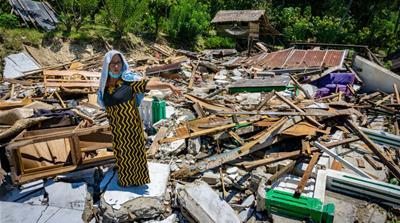In hills of Sulawesi Indonesia quake survivors chafe at aid rules
Kulawi, Indonesia – When central Sulawesi was hit by a 7.5-magnitude earthquake and tsunami a month ago, Ariyati was visiting her father who was recovering in a hospital from an eye operation.
But when she heard her village in the mountains had been badly hit, she knew she had to get home.
“I forced myself to come home because everyone was family there,” the 39-year-old mother of three said.
The rain was coming down hard as the cocoa farmer struggled to get to her village. Landslides had cut off the only road to the area and she was forced to spend the night in a settlement at the foot of the hills.
The next day she found out what had happened from a cousin.
|
‘Nightmarish’ situation for Indonesia tsunami survivors |
Three people died, including Ariyati’s 63-year-old mother who had been looking after her son and nephew. Many of the houses in the village had been flattened in a landslide. Her mother was crushed when the roof of their house fell on top of her.
“I didn’t believe it when I heard it,” Ariyati said, her home now a pile of broken timber and cement. “I fainted.”
‘There is no road’
At least 2,000 people are now known to have died in the earthquake and tsunami, which swept across the coastal communities and devastated Palu, the area’s biggest city.
More than 200,000 people lost their homes and up in the mountains where landslides buried houses and made roads impassable, people are still struggling to get the help they need and fear the rainy season will make an already difficult situation worse.
It took a week for aid to arrive in Kulawi, the area around Ariyati’s village, and when it did it was supplied by a military helicopter that has made only sporadic visits since.
“If we want to get aid from Palu, there is no road,” said Erwin Monopo, the head of the aid distribution centre for the district.
The drive from Palu used to take about three hours, but now takes at least five. Motorcyclists are forced to lift their bikes over the trunks of fallen trees and across trails of mud piled as much as three metres above the original road.
Aid distribution has been devolved to the local level and Monopo, a 42-year-old civil servant, is in charge of all government relief for the estimated 15,000 people in Kulawi.
 |
| Supplies in Kulawi’s aid distribution centre in the Central Sulawesi hills. [Ian Morse/Al Jazeera] |
“[The government] trusts us to organise everything,” he said from his warehouse where he’s helped by 30 other volunteers. “We organise and create our own rules so that no one feels like they aren’t being helped.”
Aid rules
In Kulawi, those rules include residents having to wait until all 12 metric tonnes of rice has arrived so everyone can receive their supplies at the same time.
On Wednesday, 2.5 tonnes was sitting in the warehouse, even as families around Kulawi said in the past month they had received only two allocations of rice, five kilos at a time, an amount that would normally last a family of four about three days.
“It’s definitely not enough, but what are we going to do?” Monopo told Al Jazeera. “That’s all we have and we have to distribute fast so people aren’t hungry.”
But local residents are losing patience.
Almost everyone in the area is living in tents, either because their houses were destroyed in the quake or because they fear their home will collapse, and the rainy season increases the chance of more landslides.
“Tell the volunteers in Palu to bring us cooking pans, cooking oil and batteries for lights,” said Santi Maun, 45. “Give it straight to the people. Just don’t give it to the [distribution centre] in Kulawi. They don’t distribute justly.”
Monopo understands the villagers’ anger, but said he brought in the rules because he wants to avoid creating conflict between the villagers if some people get rations and others don’t. He doesn’t know when helicopters will arrive, or what will be on board when they do, he said.
Rain and cold
Army spokesman Teguh Puji Raharjo told Al Jazeera with the state of emergency extended into December, aid drops will continue for “as long as needed”, but the local authorities would soon have to take control of the aid effort because of the cost and limited flying time of the helicopters.
Like Ariyati, most people who live in the hills make a meagre living as cocoa farmers and are now worrying about what will happen when the colder weather that accompanies the rainy season sets in.
 |
| Ariyati stands in the ruins of her house a month after an earthquake struck Central Sulawesi [Ian Morse/Al Jazeera] |
The first blankets arrived on a helicopter on Wednesday. An aid group from the neighbouring city of Poso began distributing jackets, and after seeing more people catch colds and rashes, local relief workers have suggested residents begin building new homes.
“Most of our aid is from private organisations,” Ariyati said, recalling in the weeks since the disaster army helicopters will often fly overhead, but rarely deliver assistance.
“From the government we get very little. Even until now we don’t know how we receive aid from the government. It just arrives.”




